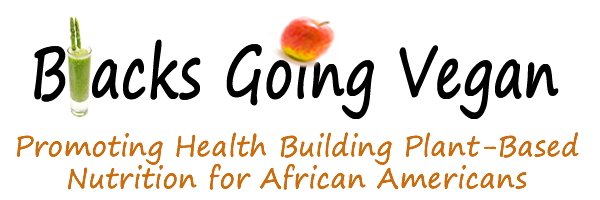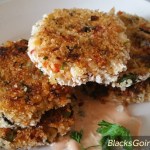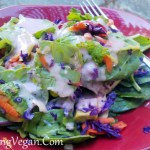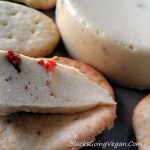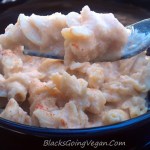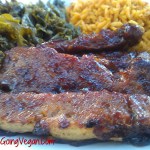Chef Bryant Terry: Black People Are Vegans Too!
Food activist, author and vegan chef Bryant Terry wants African-Americans to find a solution to healthy eating and cooking in his new book, “The Inspired Vegan.”
For the past 10 years, Bryant Terry has been a vocal part of a food justice movement whose goal is to fight for better access to quality and sustainable foods in communities of color and low-income communities. Whether he is giving lectures, teaching cooking classes or writing books, Terry is trying to better our health, one recipe at a time.
BET.com sat down with Terry to discuss his new book, The Inspired Vegan, why white people didn’t invent healthy eating and why the key to better health begins with the food we eat.
What inspired this book?
 My daughter was a huge inspiration for this book. When my wife was pregnant, I wanted to have this snapshot of this life and let my daughter have a chance of knowing who I am, what my interventions are, who are the people who have inspired me, and the family memories of habits and practices to carry on. This book is also a continuing effort to bring food to the forefront of this public health crisis, especially among African-Americans.
My daughter was a huge inspiration for this book. When my wife was pregnant, I wanted to have this snapshot of this life and let my daughter have a chance of knowing who I am, what my interventions are, who are the people who have inspired me, and the family memories of habits and practices to carry on. This book is also a continuing effort to bring food to the forefront of this public health crisis, especially among African-Americans.
My goal is not to convert people to veganism or preach to them, because you don’t have to be a vegan. But too many of us are sick and obese, and we all know that African-Americans suffer from preventable diet-related illnesses. I hope this book can inspire people to start thinking about incorporating a more plant-based diet, or say, “Hey, I am going to add more veggies to my plate” or “Eat one meal a week that is vegan or vegetarian.” Incorporating healthier foods into our diets can be a tool in helping to heal our people.
Why is being a vegan or eating healthy considered a “white people” thing?
For many reasons. First, there is this sweeping notion that all of our cultural cuisine was antebellum survival food and how we only ate the worst parts of the animals, or that mac and cheese and red velvet cake is all we eat. It just isn’t true.
We as Black people come from a legacy of African-Americans vegans and vegetarians. We come from a legacy of Black people who grew their own fruits and vegetables in a garden, who were farmers and who ate whole foods. Growing up in Memphis, my grandparents knew the importance of growing their own food. They had urban farms and raised chickens and pigs and had nut trees on their property and so did their friends.
Unfortunately, when the media writes about healthy eating and veganism, it focuses only on privileged white people. Meanwhile my influences came from people of color. 
I first became a vegan in my late teens, in 1991 when I heard the song [Squash All] Beef by KRS-One. It was about factory farming and how it impacts human health; it had a profound impact on me. I was also inspired by [comedian and social critic] Dick Gregory and [his mantra] about cooking from Mother Nature and his own personal journey. Also, Elijah Muhammad and the Nation of Islam’s focus on healthy eating, and Seventh-day Adventists who are also part of our legacy.
Being aware of access to healthy food and awareness of food issues seriously affect Black people, how does this book address that in terms of the ingredients in your recipes?
There are people who are junk-food vegans and what is made in laboratories — our bodies have a hard time digesting that food — so my work focuses on whole foods, but I also realize that some people don’t have access to foods with fancier ingredients, so I wanted to be able to have recipes that many people can have. But, I also want for people to expand their food palate, too, and try something new, yet electing more healthy food staples.
I also have a vision that for the areas that don’t have stores that carry such foods, that in five years, they will. Communities can change, and so while you might not be able to make every recipe, these recipes can inspire you to eat better and want you to make changes in your community. It’s important that as a community we fight for a better food system, and ones that are not controlled by major food companies, but ones with fresh and local-produced independent growers.
What are the things our readers can do to change their communities and rethink how they eat?
First, young people have been part of the solution. And it’s fine to be into music, fashion and culture, and we shouldn’t dispose of that. But it’s important for young people to realize that everything isn’t OK. We are dealing with white supremacy, high rates of poverty and illiteracy rates. And while there is not a lot that we can control, what we eat is one of those things.
And what you eat impacts every aspect of your life. I see young kids eating Cheetos and drinking Coke for breakfast, and not being present in class and not doing well in school. As I said before, what you eat also impacts your health. And it’s important for the young generation to be around, live healthy and whole lives — and fight this fight.
Want to learn practical ways to incorporate healthy whole foods into your diet? Watch Terry’s Web series Urban Organic here.
Category: Veganism and African Americans
